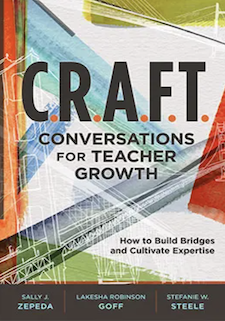Building Bridges That Cultivate Teacher Growth
C.R.A.F.T. Conversations for Teacher Growth: How to Build Bridges and Cultivate Expertise
By Sally J. Zepeda, Lakesha Robinson Goff, and Stefanie W. Steele
(ASCD, 2019 – Learn more)
Reviewed by Tanya Roy

As the opening explains, the first part of the book focuses on the “WHY,” the philosophy of C.R.A.F.T, and the “WHAT.” The explanation of the basics is clear and succinct, making it easy to understand how and why you might find this powerful in your own work with teachers.
Each chapter is written to be self-contained. It was easy to read something useful and then set the book down and come back to it. I frequently flagged portions of the book I wanted to easily review before I headed into, or after I returned from, a conversation with a teacher.
Right from the beginning the explanations pinpoint very small everyday thoughts that school leaders all share. These bite-sized and relatable issues made me want to continue onto the second half of the book, where practical and immediately useful strategies are offered.
Centering relationships

Often, when stressed by the limited time we have, educational leaders struggle to balance philosophy with action. The steps described in the second half of the book help to explain how to navigate that path.
The book uses snippets of conversations and descriptions of situations with teachers that feel a bit contrived, but their purpose is clear and their messages are applicable. I appreciate that the conversations and situations are revisited at later times in the book, after new ideas have been introduced and described.
In this way it’s easy to see how applying a particular step can result in teacher growth. I found it helpful to stop and jot down a real-life situation which mirrored the one used or that paralleled it. This helped me to identify which steps would be useful with my specific teachers.
Some of the recommendations listed in the second half of the book are great common-sense strategies for people new to school leadership. The validation of things you may already be doing is a nice bonus.
This book describes C.R.A.F.T. conversations as a cycle which mimics the coaching cycle used in educational coaching. It encourages multiple small conversations with the larger goal in mind, which is a tried-and-true way to build relationships.
Effective reflective questioning
Much of the book is written by posing reflective questions to the reader – a technique that is effective in helping the reader see areas where they can use the ideas to grow in their own practice as well as their relationships with teachers.
The end of the book feels a little bit rushed as it tries to cover a lot of ground in its additional discussion of other school leadership principles and how they work together with C.R.A.F.T. conversations. I found it most effective when I went back into the book and looked at each part of the cycle as it would be effective in work with school climate and school culture.
It is clear that this book – as it suggests about C.R.A.F.T. conversations themselves – is the beginning of a bigger undertaking. However, the book offers compact, sustainable practices within C.R.A.F.T. conversations that school leaders can implement immediately with positive results.
Tanya Roy has been an educator in NYS for 24 years and has worked with teachers as a Literacy Coach since 2006. Her degrees in special education, elementary education, literacy and literacy coaching have allowed her to help train teachers in the best educational practices for all students. The lens for all her work with teachers is focused on growth mindset, relationship building, trauma informed teaching, and mindful education. Tanya’s love of literacy and language has also helped her achieve international acclaim as an award winning storyteller.































Thank you for your recommendation of this book! As I look back on what impact I have had in my classroom, I am noticing the things that stand out to me are the connections through relationships. The small steps I take towards connecting with students, parents, or colleagues are what make my days meaningful. However, I “struggle to balance philosophy with action.” This is a book I am putting in my Amazon cart to help me cultivate my teacher growth this year. Thanks again!